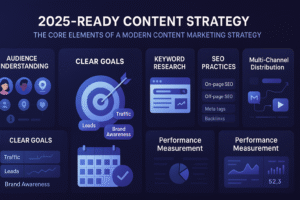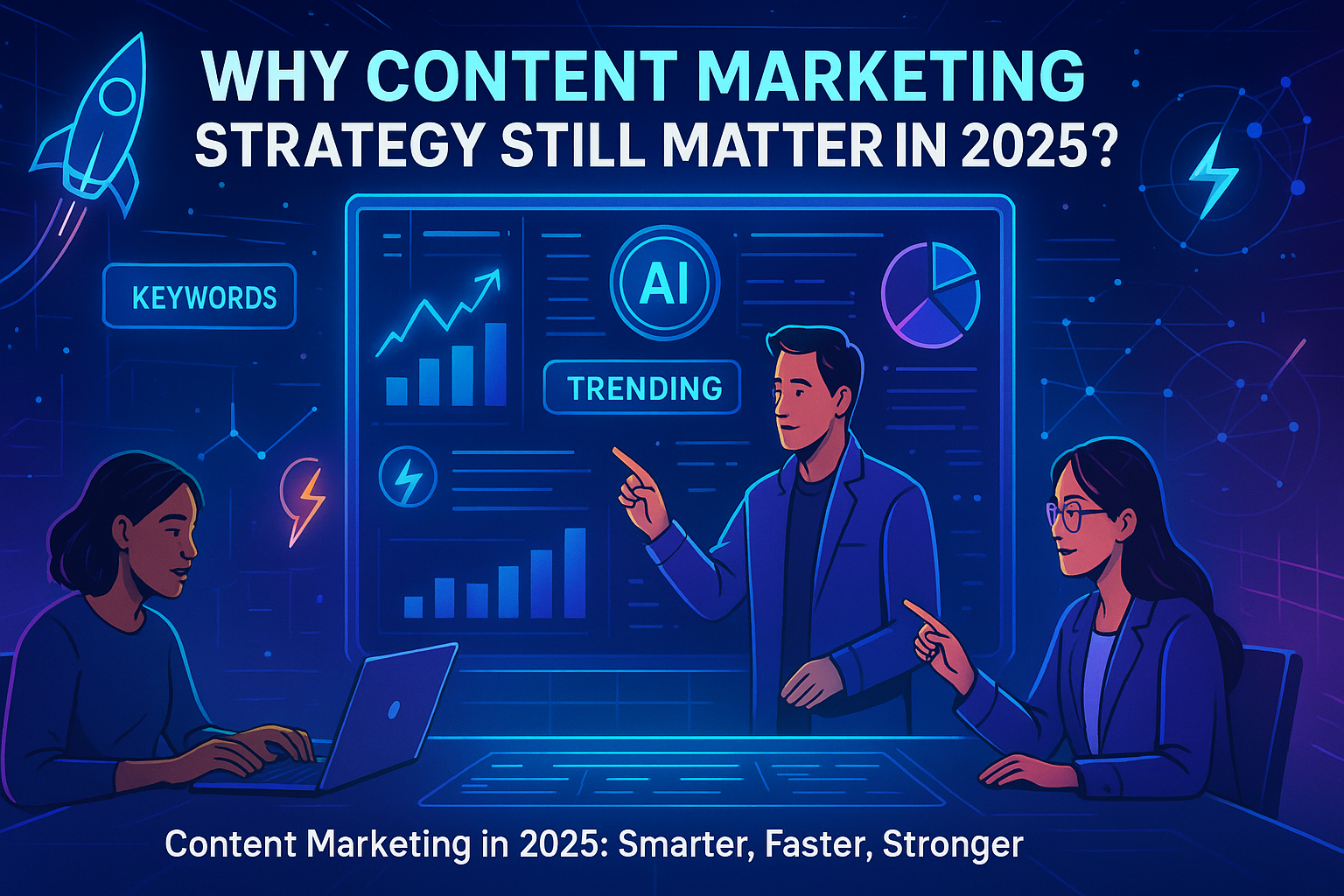In 2025, the digital world will continue to evolve at a rapid pace. With the rise of AI-generated content, shifting algorithms, and changes in consumer behavior, some might question whether traditional content marketing strategies still hold value. The short answer is yes — and perhaps more than ever before. A thoughtful and well-executed content marketing strategy remains a cornerstone for building trust, driving traffic, and achieving long-term business goals.
In this article, we will explore why content marketing strategy continues to be relevant in 2025, the role it plays in a complex digital world, and how organizations can align their efforts to meet changing demands. By the end, it will be clear that while tools and channels may evolve, the foundation built by a sound content strategy is here to stay.
The Evolving Digital Landscape in 2025
To understand why strategy matters, one must first know where we are today when it comes to digital marketing. By 2025 search engines and social platforms are more complex than ever. AI delivers curate experiences for users, search intent has become very sophisticated and privacy concerns have framed how brands capture and leverage data.
With these changes, users will desire parochial and relevant content. They are more selective, devoting them time and attention to only that piece of content, which offers real value. This becomes a high bar for marketers and the Load it and a scorched earth approach to producing huge volumes of content that are not aligned to strategy no longer evokes the hoped for results.
Why Content Marketing Strategy Still Holds Strong in 2025
Search Engines do not value Quality Content
Although there is growth in AI and even in Machine learning, the search engines continue to favor content that exhibits expertise, authority, and trustworthiness. A lot of Google algorithm updates within the past few years have favored helpful, people-first content. That trend continues in 2025.
An integrated content marketing strategy ensures that all content is in line with those of the users and search engines. It helps in keyword research, or on-page SEO practices, polish of content, etc. Without such a strategy, even well written content may otherwise get buried by competitors who have optimized their position much better.
Content Prelays Every Step of the Customer Journey
In 2025 customers are more fragmented and complex as users interact at many touch points before making decisions in journey presence. Content is integral at every one of these stages from awareness right through to consideration and up to and including decision-making.
An organized strategy of the content ensures that businesses are well equipped with the right contents for each stage. The informational blogs, detailed guides, FAQs, and compare articles – educate prospects, and the case studies, testimonials and product pages – convert leads to customers. This orchestrated approach educates the people and develops relationships over time.
Experience a Framework for Consistency
Consistency is one of the hallmarks of successful 2025 marketing. It may be voice, it may be tone, it may be messaging, or it may be publishing frequency – but consistency builds recognition, and it builds trust. Without a written content marketing strategy, sustaining that consistency in various teams, platforms, and campaigns seems to be a problem.
A clear strategy plays the role of a blueprint which includes the statement of goals, audience personas, content themes, and distribution plans. IT keeps people all on the same page even as new technologies and channels arise. Such consistency strengthens brand identity and increases efficiency in overall marketing.
Audience Expectations Have Grown
Consumers of today are better informed and more discerning. They want customized, superior quality content which they will relate to and uniquely benefit from. Generic, husband and wife marketing no longer captivates attention or stimulates activity.
A good strategy for content starts with the audience. It entails in-depth research to understand preference, behaviors and pains. This helps businesses to develop meaningful content that will solve real problems hence enhancing relevance and engagement.
Content Powers Other Marketing Channels
Although these platforms, including social media, paid ads, and email marketing continue to change, they all need high quality content to work optimally. In the year 2025, content is the glue holding campaigns together on all channels.
For example, one blog post can be transformed into several social media updates, emails newsletters, and small videos as well. A vast content strategy guarantees that these efforts are integrated smoothly, increasing spread and effectiveness while minimizing redundancy.
Data-Driven Decisions Require Structured Strategy
Modern marketing is based widely on data to refine and optimize efforts. However, such data can result in wrong decisions. A well-built content strategy delivers that context, determining targets and key performance indicators (KPIs) by which data may be measured.
With a strategy in place, teams will be in a position to find out how things are working their way, what needs to be altered and where there are new opportunities. This data driven approach is vital in 2025 where agility and responsiveness are key to remain competitive.
AI and Automation Require Human Strategy
With the help of AI tools content creation also became faster and scalable. On the other hand, they bring a risk of homogenized, generic outputs, absent a clear human-led strategy.
A solid content strategy helps to make AI-generated content match brand voice, audience expectations, and business goals. It also helps to establish the circumstances, when human creativity and originality is needed in order to distinguish from competitors within the same tools of automation. This equilibrium of technological and strategic balance will produce more effective and authentic content.
It Future-Proofs Your Efforts
Digital trends, and algorithms, are bound to change unpredictably. What will work today may not work tomorrow. A flexible, well-documented content marketing strategy is a stabilizing force in this turbulence.
Instead of chasing the newest trends, the businesses can create resilience by concentrating on long-term goals, the relationships with the audiences, and the positioning of the brands. Their content efforts for content marketing are effective even though individual tactics and tools change.
The Core Elements of a Modern Content Marketing Strategy

Building on its continued importance, what would a 2025 ready content strategy include? Below are the basic elements that are still relevant now.
Audience Understanding
Demographic profiles derived from gender, age, geographical units, and personal utilities, and behavior patterns and likes and dislikes.
Clear Goals
Clear objectives in terms of numbers are to be set, such as increased site traffic or leads or brand awareness.
Keyword Research
Current keyword targeting that responds to changing search habits and user intent.
Content Calendar
A planned approach to publishing regular, relevant content, in selected channels.
SEO Best Practices
On-page and off-page strategies to increase profile and ranking.
Multi-Channel Distribution
Strategies for recasting, repurposing, and disseminating content through social media and e-mail channels.
Performance Measurement
Technologies to monitor KPI’s and tweak strategies according to live analytics.
Avoiding Common Pitfalls in 2025
Although a content marketing strategy is an acknowledged necessity, pitfalls to be avoided must be kept in mind.
Quantity taken before strategy does not help in addressing the issue. Generating an overabundance of material without a defined course can cause blunt effect and overstretched resources.
Neglecting Audience Feedback: Neglecting to personalize content to reflect user behaviour and feedback may mean that lost opportunities are not achieved to reach out to the viewers.
Over-Reliance on Automation: Relying too much on automated tools instead of human meaning might lead to the loss of audience authenticity.
Skipping Performance Reviews: Absence of continuous performance examines deters continuous adjustments and increases effectiveness.
By avoiding these pitfalls, it is possible for companies to have effective and updated strategy.
The Future of Content Strategy Beyond 2025
In the near-term, the role of content marketing strategy is likely to be much more prominent. Advancements such as voice search, virtual reality (VR) and augmented reality (AR) will open new innovative ways of connecting with audiences. Nevertheless, these developments will also require the production of various kinds of content without departing from essential strategic objectives.
At the core of content strategy going forward, it will continue to mark its territory in terms of grounding itself in audience insight, value and trust. As different forms of content are adopted in form of text, video or interactive experiences, these principles shall still remain relevant.
FAQ:
Q1: Content marketing is the latest victim of advances in AI and automation?
No. The investment in AI for content differences is important, but with the constant development of technologies, automated profits need a human proqued content marketing plan to to remain relevant to brand aims and audience needs, and this builds authenticity and performance.
Q2: Is SEO still important in 2025 for content marketing?
Yes. Top-notch search engine friendly content matters a lot, hence SEO is still pertinent despite the quality of content. Using the latest approach to SEO helps make sure that your content is presented in appropriate search results.
Q3: How does content strategy differ from content marketing?
While content strategy is the guide that supports the development of content, content marketing is the use of the developed content in an execution and delivery process to make marketing goals a reality.
Q4: Can I rely solely on social media instead of content marketing?
Social media is one way of getting to your audience, but there are other means of doing so. But by widening the scope of your content marketing, you ensure uniformity, increase your SEO, and deepen the customer relations with you through different channels.
Q5: What makes content strategy future-proof?
By focusing on the needs of its audience, offering consistent value, and preparing for flexible plans, a content strategy turns out to be better prepared to respond to a constantly evolving technology, the platform and the behavior of consumers.
Q6: How often should I update my content marketing strategy?
It is better to review your content strategy in 6 to 12 months, based on data insights, input of an audience, and future trends.
Conclusion
The prime elements of digital marketing in 2025 will not change with strong, consistent content creation. Notwithstanding continued enhancements in technology and tools and gadgets, the relevance of a well planned out content marketing strategy is unchallenged. Such a strategy remains relevant, strengthens customer connection and generates quantifiable returns amidst the increasing competition.
A customer-orientated, properly structured approach not only ensures that firms are able to defuse current impediments, but also ensures that they become able to spot new opportunities. Thriving in 2025 requires a clear cut content strategy that is a critical competitive advantage.




